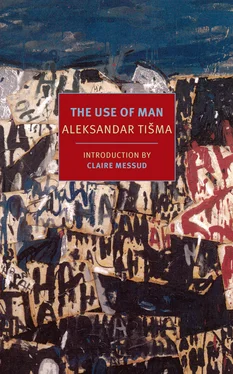Aleksandar Tišma - The Use of Man
Здесь есть возможность читать онлайн «Aleksandar Tišma - The Use of Man» весь текст электронной книги совершенно бесплатно (целиком полную версию без сокращений). В некоторых случаях можно слушать аудио, скачать через торрент в формате fb2 и присутствует краткое содержание. Год выпуска: 2014, Издательство: NYRB Classics, Жанр: Современная проза, на английском языке. Описание произведения, (предисловие) а так же отзывы посетителей доступны на портале библиотеки ЛибКат.
- Название:The Use of Man
- Автор:
- Издательство:NYRB Classics
- Жанр:
- Год:2014
- ISBN:нет данных
- Рейтинг книги:5 / 5. Голосов: 1
-
Избранное:Добавить в избранное
- Отзывы:
-
Ваша оценка:
- 100
- 1
- 2
- 3
- 4
- 5
The Use of Man: краткое содержание, описание и аннотация
Предлагаем к чтению аннотацию, описание, краткое содержание или предисловие (зависит от того, что написал сам автор книги «The Use of Man»). Если вы не нашли необходимую информацию о книге — напишите в комментариях, мы постараемся отыскать её.
A work of stark poetry and illimitable sadness,
is one of the great books of the 20th century.
The Use of Man — читать онлайн бесплатно полную книгу (весь текст) целиком
Ниже представлен текст книги, разбитый по страницам. Система сохранения места последней прочитанной страницы, позволяет с удобством читать онлайн бесплатно книгу «The Use of Man», без необходимости каждый раз заново искать на чём Вы остановились. Поставьте закладку, и сможете в любой момент перейти на страницу, на которой закончили чтение.
Интервал:
Закладка:
Here he paused, allowing Milinko to plunge into the books before him, and returned the volumes to the shelves when they were done with. But Milinko suddenly stopped and sighed: What was the use of looking at something he couldn’t obtain? He would have to go to Austria to buy books of this kind — to Germany, that is, now that the two countries were combined— with his pockets full of marks. Not at all, Kroner said cheerfully. In every trade, even in the book trade, business could be done by correspondence, and Milinko had only to send a postcard to the publishers of the encyclopedias he wanted, and he would receive detailed catalogs and price lists. “Unfortunately, or let us say, in this case, fortunately”—his thin, mobile mouth in a wry smile—“Austria — or, rather, Germany — is now not only our neighbor but, so to speak, our second identity, which undoubtedly will make it easier for such purchases to be made.” He went around the wide desk, opened a drawer, rummaged through it, and pulled out a bundle of brochures and booklets held together by a yellow rubber band. “These are some old catalogs I happen to have.” He spread them out, arranged them on the desk. In addition to printed information, there were photographs of the books in rows of dark red, blue, green. “Brockhaus, Langenscheidt, Meyer, Knaurr — you’ll find those the most interesting,” pointing to each with his long, thin middle finger. “Of course they are out of date; you must ask for new ones.” He tore a sheet of paper from a note pad and handed it to Milinko with a pencil. “I suggest you draft a simple request first, to fit on a postcard.” He looked over Milinko’s shoulder as the sentence was slowly and thoughtfully written. “I think it might be better to put schicken instead of senden. Sounds more businesslike,” he remarked, but otherwise noted, with surprise, that Milinko’s German was correct. “If only Gerhard or Vera could write a letter like that! How long have you been studying German?” When he learned that Milinko had been taking lessons as long as Vera and that, unlike Vera and her brother, he had never heard German spoken, Kroner was most impressed. Milinko, flattered, did his best to carry out these instructions, and on his next visit he reported to his adviser that the postcards were mailed.
Milinko waited for the replies, and Kroner waited with him, never once failing to ask about them when Milinko came to the house. The first reply arrived after ten days: a stiff, yellowish-brown envelope with a two-pronged metal fastener and a white address sticker with Milinko Božić’s name and address neatly typed. From it slid a whole pile of triple-folded brochures describing expensive books: histories, geographies, encyclopedias, dictionaries, much more than Milinko had requested or expected. He immediately took the package to Kroner, who was not at home, but Milinko asked the maid to put the envelope in the study, and that evening he went back so that they could enjoy it together. They studied the catalogs, read them over each other’s shoulders in half-whispers, but raised their voices when they came to important things: number of volumes, price, method of payment. Kroner took a pencil and underlined. Milinko made up his first order. More catalogs arrived, and soon thereafter a parcel of books: Knaurr’s World Atlas, which they examined together in great excitement. The ordering became, within the limits of Milinko’s schoolboy budget, a constant occupation for them, an inexhaustible subject of plans and discussions.
But then, on Main Street, after large-scale renovation of an ironmonger’s shop vacated by a Serb, there appeared display windows full of German books at very reasonable prices, and a sign over the entrance, in Gothic letters: DEUTSCHE BUCHHANDLUNG. Milinko could now browse, inspect, and buy on the spot anything he wanted, no longer needing the assistance of Kroner to cross the boundaries, albeit “erased,” between countries. For Kroner, this meant a separation. If he went into the German bookshop with Milinko and was recognized as a Jew, they might throw him out, insult him. And he, insulted, might lose his temper. So he stayed at home, retreating into its rooms and furniture, into their lifelessness and silence.
For four hours in the morning and for as many in the afternoon, he was in the office, keeping the books, the inventory, listening to conversations, which ebbed and flowed, as in most places where people congregated, about what they felt, what they knew, and what they wanted to find out. Sometimes the words were addressed to him, sometimes to Count Armanyi, sometimes to Julia Nemethor, the cashier, or to Žarko, the porter. The words disturbed Kroner as much by their sound as by the monstrousness they carried. He had heard these things already from Sep Lehnart, in a dense, bloodstained mass, and could take no more; each new arrival, each new voice made his flesh crawl. Exhausted, he would return home and wrap himself in solitude like a man bandaging a wound. His family, too, troubled him, for their very existence meant the possibility of exposure to new harm.
Only Milinko did not disturb him, since Milinko’s words were peaceful; they settled alongside the books like birds settling on their nests. Milinko, he knew, would arrive in the early evening, at the usual time for young lovers; the unimaginative young man had never thought to suggest anything else, and the time coincided with the hour Kroner withdrew after coming home from the office. Kroner sat in his room, the blinds lowered, separated from the dining room by a frosted-glass door that went from wall to wall, opening in the middle and folding back in double flaps. He did not switch on the lamp or turn on the radio, but sat slumped in his armchair, resting, his eyes closed. As soon as he heard the doorbell, however, he would take the book ready on his desk and open it at random. This was not hypocrisy — he liked to receive Milinko with a quotation from a book. It was a way of starting a peaceful conversation. He would look up from the book and see Milinko’s outline approach across the dining room, stop to let the maid pass on her way to Vera, hesitate before the glass door, then lift his hand to knock. Kroner would shout “Come in!” and Milinko would enter. “What are you reading today?” Milinko would inquire and, without waiting for an answer, crane his neck to see. As a rule it was a book from Kroner’s youthful Vienna days, stories or a novel by Arthur Schnitzler or Paul Heise, though he would sometimes select an older writer, Heine, Goethe, Schiller, from a series of collected works with titles printed in gold, or a biographical novel by Stefan Zweig or Lion Feuchtwanger. It had been a long time since he had read these books — some he had never read at all — but he looked at them now with nostalgia, turned them over, tapped them with a finger, as if they were made of the finest china.
“Goethe,” he said, drawing out the name melodiously. “ There was a phenomenon only the Age of Enlightenment could produce, that great century which celebrated light, clarity, and balance. We have no men and no writers like that today. Mysticism now rules the world, the cult of blood and violence, darkness, the longing for the past, nationalism. Do you think that anything great and noble, like this book, can come out of such chaos? No; you’ll see, our time will be remembered for its barbarity and barrenness.” At this point he felt that by generalizing he was rather dishonestly winning the young man over to a point of view rooted in his own downtrodden state, but he justified it with the thought that the enemy, fascism, without any such scruples, was corrupting not one person but thousands at a time. Kroner was attracted by the idea that although he himself could not take up arms, as Gerhard had suggested, he could at least prepare someone else to make that decision. This was also his answer to Gerhard, a justification of a kind, proof that he was not entirely incapable of action, that, though not a fighter, he could contribute in his own way to the fighting. Kroner, indeed, hoped, with the double egotism of a father and an ideological opponent, that Gerhard, his son, would fail as a fighter and that Milinko, his champion in the contest, would triumph through patience, reason, and determination.
Читать дальшеИнтервал:
Закладка:
Похожие книги на «The Use of Man»
Представляем Вашему вниманию похожие книги на «The Use of Man» списком для выбора. Мы отобрали схожую по названию и смыслу литературу в надежде предоставить читателям больше вариантов отыскать новые, интересные, ещё непрочитанные произведения.
Обсуждение, отзывы о книге «The Use of Man» и просто собственные мнения читателей. Оставьте ваши комментарии, напишите, что Вы думаете о произведении, его смысле или главных героях. Укажите что конкретно понравилось, а что нет, и почему Вы так считаете.












